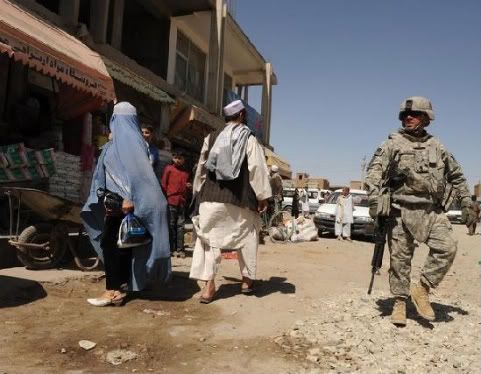Are we still not allowed to call this a recession?
Last week, the giant NUMMI car factory closed down in nearby Fremont (30 minutes south of Oakland). Just like that, the last auto plant in California and only unionized Toyota factory in the country was gone. 5,000 jobs just at the plant gone, another 20,000 that supported it in danger.
My years in Wisconsin gave me a glimpse into life (and death) in the Rust Belt. Factory closings in Milwaukee, Racine, Janesville: these towns of my friends and co-op roommates are shells of what they used to be. Corporate outsourcing doesn’t just stop machines from running, it’s destroys the lives of millions of people. It’s not deindustrialization, it’s dehumanization.
I’ve spent less time in the Bay Area, but I’ve been to Fremont a couple times for work. In solidarity with the NUMMI workers, and anti-war soldiers, here’s a short story I wrote last year. From the Bay to Afghanistan and back.
– – –
Of Writers and Warriors
Today is my first day at the new gig. For the next ten weeks, I’m going to free young minds from the terrorism of standardized pedagogy and equip them with the literary weapons of mass liberation. Translation: I’m teaching a poetry workshop every Tuesday and Thursday at the local high school.
This school is less local than usual, though. It’s in Fremont, a semi-industrial town of 200,000 between Oakland and San Jose that can’t make up its mind if it’s a suburb or a legitimate city in its own right. Before today, all I knew about the place was that it was home to the biggest car factory in Cali: 5,000 workers, the only unionized Toyota workers in the country. And of course that the A’s were trying to move there from Oakland. But what company wasn’t trying to get out of Oakland?
When I get to the school, the teacher who has organized my workshop meets me at the main office. Looking out at the sea of students showing off their faux-hawks and headscarves on their way to class, she notices my interest.
“This school, this town is the immigrants you never hear about on CNN,†the teacher says with equal parts pride and warning. “Kids coming from the Philippines, Russia, Peru, a whole bunch from Afghanistan.â€
Afghanistan? All I knew about that country was Taliban, mullahs, burqas, and the fact that every military power since Alexander the Great had met its demise in its mountains. My boy Kevin has been stationed in Kabul for three months. He’s 23.
* * *
Ahmed is 17. Born in Kabul, raised in Fremont, his dad builds Corollas and is a UAW shop steward, pushing for better health care in the next contract. When I ask the students at the opening workshop if they have any experience with poetry, Ahmed says his father used to read him On the Road by Jack Kerouac because he thought it was about cars.
The first workshop I always do is some form of Where I’m From exercise. Going off examples from Carl Sandburg (Chicago) and Mos Def (New York), I ask the 12 teenage girls and Ahmed, the only boy, to personify their hometown, to tell us the beautiful, brutal truth of where they grew up. During the sharing, we hear stories of a prostitute who wanted to be a lawyer (Manila), a single father who can’t afford the rent (East Palo Alto), and a strong cowboy on the move (Michoacán).
Ahmed, who has been clapping the loudest after every poem and I’m suspecting may be less interested in being the next Kerouac than being around 12 teenage girls with a soft spot for love poems, doesn’t want to share.
“Come on, man, there’s no wrong answers,†I prompt him. “This is just a first draft. We all just want to hear what you got. Don’t you girls want to hear Ahmed’s piece?â€
“Yeah, c’mon Ahmed!†The girls’ cheers do the trick.
“Ok, fine,†he smiles. “Coming straight outta Free-town / we got BART ending here, it’s all going down / punks don’t stick ‘round long / but from the tracks to the bay / I rep where I’m from…â€
And another 12 bars of how gangsta Fremont is. Not bad rhymes actually, compared to what I’ve heard in other workshops. It’s just not what I think Fremont really is. Or more importantly, what Ahmed is. 12 bars, and not a single mention of Kabul.
* * *
Kevin’s main assignment in his “new home for the next twelve to eighteen months,†as he wrote me in the letter, was to protect foreign officials (governmental and corporate) coming in and out of Kabul. Not exactly what he was hoping for (that I ever knew), but at least he didn’t have to leave the capital – that’s where things really got ugly.
Kevin was no pacifist, but he wasn’t a gun-toting, Fox News-quoting militiaman either. Joining the National Guard last year after his Cal State tuition got higher than Bush on a Texas bender, he never thought he’d actually point a gun at anyone. Coming west from DC five years before me, American higher education sent Kevin to Kabul, and not to study abroad.
So I could understand why Kevin was pissed when, on his first day, he was given the task of guarding the new president of Harvard. Instated after her Ivy League predecessor was run out for saying women were biologically inferior in math and science, she was in town on behalf of the State Department to reopen Kabul University and show how the U.S. disposal of the Taliban had opened doors for Afghan women in education.
As he stood at those very doors holding his AK-47, Kevin looked out at the hundreds of students that made up the incoming freshmen class and noticed only one actual pair of Afghan breasts. Looking at their owner, he saw a striking young woman with deep gray eyes sneaking out from under a turquoise hijab. By instinct, he smiled in her direction. To his surprise, she smiled back.
* * *
The Fremont workshops are progressing well. The students write with increasing passion and poise, learning how to transform a tired cliché into an original creation. More students are joining in, even a couple more boys. Ahmed really gets into it now, enjoys creating complex rhyme schemes and extended metaphors. He’s even starting to move beyond the MTV themes of money and women that every teenage male poet-who-wants-to-be-a-rapper starts out with.
In our fourth week, Ahmed reads a piece that stays true to his hip-hop rhythm but explores more vulnerable territory.
Line after line, he raps about wanting to get a tattoo and his father’s subsequent refusal. After referencing the Koran, he spits, “I’m trying to paint my body as sacred text / ink to pink skin, Father, please let me get blessed.â€
It’s his best piece yet, and I tell him so. After the workshop, with everyone else having left, I ask him, “So, what kind of tattoo are you trying to get?â€
“Nothing,†he shrugs. “You wouldn’t understand it.â€
“Why not?†I say. “It’s not one of those ones that you think is a Chinese symbol meaning Ocean Soul but is really Japanese and means Cheap Sushi, is it?â€
“Nah,†he laughs. “All my boys have it inked on their left shoulder. It’s our crew initials. Not a gang or nothing. Just our crew. Forever Afghan Gunners.â€
“Wait, wait…Forever Afghan Gunners. You’re gonna tattoo those initials? This might not be the type of crew you were thinking it was.â€
“Man, stop playing. It’s not even like that. It’s just, everyone else has their crew for protection – the Mexicans, the blacks, the whites (except they call them cops). We gotta watch our backs too. Last year, some punk kids from Union City beat my sister up, called her ‘Terrorist! Terrorist!’ They broke her nose and ribs, man. We gotta know who our people are, who we can count on.â€
I think back to DC, when Kevin and I used to break up high school fights between different groups, the unsuccessful UN mediators of the senior class, saving our own fists for each other.
“Yeah, but who ARE you, Ahmed?†I ask, my voice rising. “Is this tattoo for you, or for those so-called friends who you have to lie to every week when you come here? Are you trying to be a sacred text, or just another tat up in San Quentin?â€
“Man, I’m just trying to be remembered,†he says and walks out the classroom.
* * *
Kevin and Muneera, as she told him her name later that day at the university, carried out their romance in secret for three months. After his fifteen-hour shifts, and before she left for class, they shared three intense hours together in her dorm room. With his Army pass, he could get nearly anywhere in Kabul, and since she was the only occupant of the female floor in the dorm, no one ever saw them together.
They tried not to talk about the war that brought them together. That attempt lasted two days. After that, they talked more than they made love, and the conversations were even sweatier than the sex.
“If you’re so against Bush, why did you join his army?â€
“If you’re so against the U.S., why do you go to the school we set up?â€
As lovers and students, warriors and writers, they had more questions than answers. Muneera passed her first semester exams as an engineering major, Kevin guarded various ministers and CEO’s without firing a bullet. They both heard the stories – the soldiers who killed three unarmed boys outside the city; the resurgent Taliban beating women who didn’t cover their heads. Both with rumored government support. Kevin and Muneera had both grown up with violence. The only thing that changed was the names of the dead.
One day, a bomb went off outside Kandahar, near Muneera’s home village. Twenty people died, mostly women and children. When Kevin arrived at her dorm that night, she was gone, leaving a room full of textbooks and a note with his name on it. It read:
Love can’t conquer all.
Neither can Americans.
* * *
Ahmed never came back for a fifth workshop. I continued to teach at Fremont, and we produced a nice anthology of student writing, one poem shorter than I’d hoped. Driving home after the last session, I stopped at the Toyota factory, its smoke blending seamlessly into the East Bay fog. I dropped off a copy of the poems, then went home to work on lesson plans.



It’s 4:53 AM as I begin typing this comment. It took me a little over 4 minutes to read the story. A little over 1 minute to think of what anonymous name to use. I’ve been up for about 1,075 minutes today. Your story reminded me as to why I stay up on these nights – hoping to stumble upon something novel; to be inspired. There is no way to describe how profound and truthful i found the story to be, all i can say is that thank you for reviving a feeling and uplifting me, and writing words that people can find transcendence through. Keep writing, keep speaking. It matters.